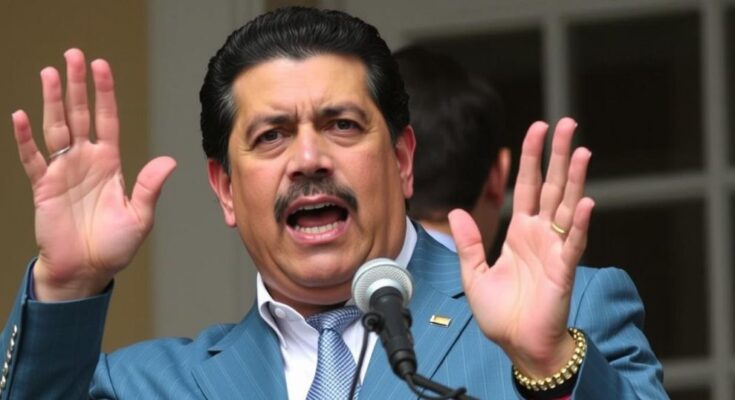Nicolás Maduro was sworn in for a third term as Venezuelan president amid heavy security and protests, with significant allegations of electoral fraud suggesting he lost the election to Edmundo González. María Corina Machado, a key opposition figure, was briefly detained during protests, raising international concerns about human rights abuses. The legitimacy of the election results remains contested, leading to widespread condemnation and demands for accountability.
President Nicolás Maduro has been sworn in for an extended term, despite significant evidence suggesting he actually lost the latest election. The ceremony took place on Friday amid heavy security presence in Caracas, even as protests against his assumption of a third six-year term intensified. Opponent María Corina Machado, who has been barred from running for office, led protests demanding that candidate Edmundo González be declared the rightful president. Following her participation in the rally, Machado faced a brief detention by security forces.
The backdrop of this tumultuous event raised international concern, particularly given the allegations of electoral fraud surrounding the election results declared by Maduro’s regime. The Venezuelan electoral authorities announced Maduro’s victory shortly after polls closed, yet did not provide detailed vote counts as was customary in previous elections. The opposition challenges this claim, presenting evidence they assert shows González received significantly more votes than Maduro.
In light of these controversies, Maduro solicited a review of the election results from the high court, which is aligned with his political party. The court simply reaffirmed the electoral outcome without offering substantiated proof of Maduro’s win. Internationally, entities like the U.S.-based Carter Center have backed the opposition’s numbers, adding to the mounting calls for governmental accountability. Moreover, the events surrounding the inauguration were marred by a violent crackdown on protests, with numerous individuals reportedly subjected to arrests and abuses in custody.
The absence of international dignitaries from the inauguration speaks volumes about the global perception of Maduro’s legitimacy. Colombian President Gustavo Petro’s decision to boycott the event underscores a regional disapproval of the economic and humanitarian crises precipitated by Maduro’s administration. Critically, the fate of González, currently in exile, remains uncertain as government officials have threatened him with arrest upon his return to the country. The level of repression and the government’s ongoing attempts to suppress opposition adds to a troubling climate in Venezuela as the nation grapples with the ramifications of this contested leadership.
The political landscape in Venezuela has become increasingly tumultuous under President Nicolás Maduro, whose regime has faced widespread allegations of electoral fraud and human rights abuses. The most recent election prompted an outcry from opposition leaders, notably María Corina Machado, as they accused Maduro of manipulating the electoral system to maintain his grip on power. The violence against protesters and coercive tactics directed towards opposition politicians reflect a regime committed to quelling dissent. Additionally, international leaders have expressed concern regarding democratic governance in Venezuela, complicating Maduro’s standing on the global stage.
In summary, Nicolás Maduro’s inauguration for a third term represents a culmination of ongoing disputes over election integrity and governmental repression in Venezuela. The absence of credible evidence supporting his election victory and the violent response to protests highlight the precarious nature of political freedoms in the country. The international community continues to scrutinize the situation with calls for accountability, while the future of opposition leaders like Edmundo González remains fraught with uncertainty. Maduro’s administration continues to face significant challenges as dissent grows against its authoritarian practices.
Original Source: wsvn.com




